June 19, 2025 | 02:55 GMT +7
June 19, 2025 | 02:55 GMT +7
Hotline: 0913.378.918
June 19, 2025 | 02:55 GMT +7
Hotline: 0913.378.918
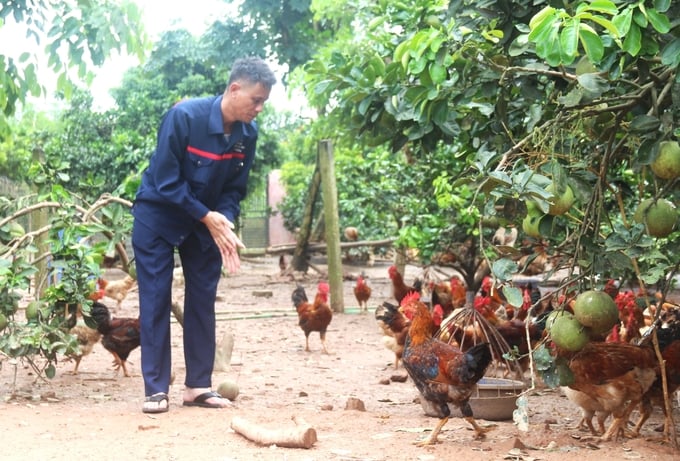
Bui Quang Huu, Director of Tan Tien Hill Chicken Cooperative, taking care of the chickens. Photo: Pham Hieu.
Following the modern consumption trend worldwide, Vietnamese consumers have also invested in their own and their family's health by being willing to pay for agro-products of natural origin, ensuring quality and food safety.
Grasping the market movement, people, cooperatives, and agricultural production units in many localities have proactively changed methods in terms of production and customer approach. They aim to provide quality products and open up more choices for consumers to access clean and safe food.
Tan Tien Hill Chicken Cooperative (Tan Khanh Commune, Phu Binh District, Thai Nguyen Province) can be considered a prime example. All 22 members of the cooperative are raising native chickens organically.
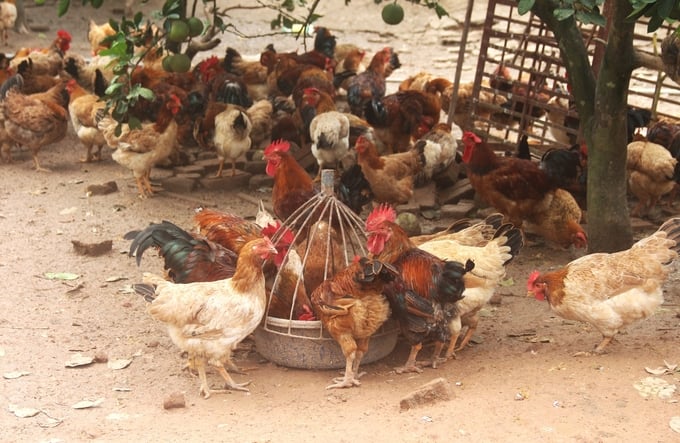
Chickens are raised under the antibiotic-free method. Photo: Pham Hieu.
Compared to the old farming method, the new method requires farmers to spend more effort mixing biological products with animal feed every day, then composting until the next day to have enough conditions to feed the chickens.
“After more than four months of implementing and applying the antibiotic-free farming model, the chickens not only grow well but are also healthier, with a survival rate of 97% and an average weight of more than 2 kg/head,” said Bui Quang Huu, Director of Tan Tien Hill Chicken Cooperative.
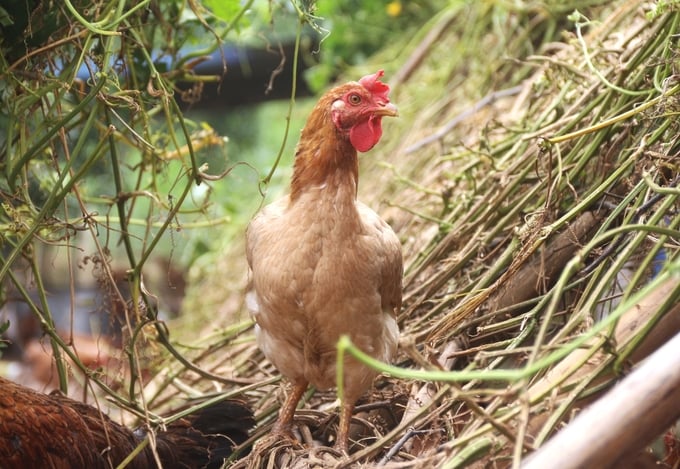
The chickens grow well with a survival rate of 97%. Photo: Pham Hieu.
Thanks to the antibiotic-free farming method, chickens will bring more profits to farmers along with other benefits. The first and greatest benefit is that the antibiotic-free farming method will help ensure the health of farmers as well as consumers.
The second benefit of the antibiotic-free farming method, according to farmers, is the cost efficiency when preventing and treating diseases in chickens. Huu said, “When using the traditional chicken farming method, for every 1,000 chickens, it would cost farmers nearly VND 10 million to buy antibiotics. However, since switching to the new farming method, farmers only need to spend approximately VND 5 million on disease prevention and treatment, which means they will save VND 4 - 5 million”.
As for the third benefit, by not using antibiotics, the chickens are available for sale 5 - 7 days earlier, hence and additional saving on feed costs for farmers.
When applying the antibiotic-free method to chicken farming models, the chicken meat, although less fatty, is softer and shows an upgrade in terms of deliciousness. The chickens will have very soft breast meat without residue. Tan Tien hill chicken meat products have thus been widely accepted and highly regarded by consumers.
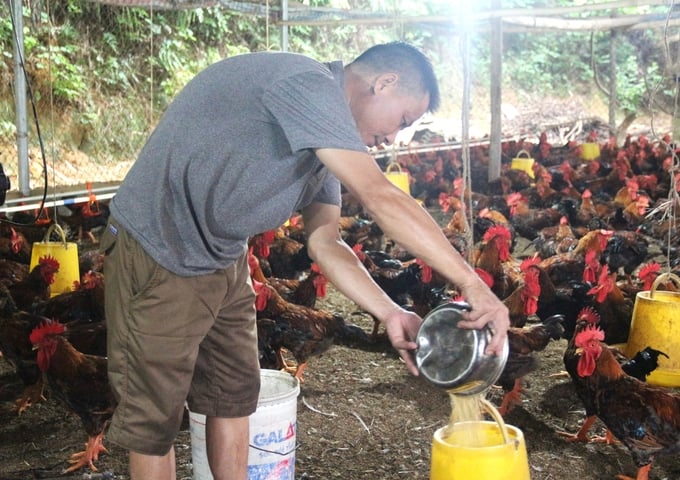
Thai Nguyen province is focusing on developing livestock farming in the direction of biosafety and organic farming. Photo: Pham Hieu.
The demand for food is expected to increase during the end of the year and the upcoming holidays. Therefore, production facilities need to pay more attention to controlling and proving product quality. Traders will aim for chickens in beautiful form and sell them to big markets in Hanoi, Hai Phong, Quang Ninh, and Bac Ninh.
According to Do Dinh Trung, Deputy Head of Thai Nguyen Sub-Department of Livestock Production, Animal Health and Fisheries, the Thai Nguyen livestock industry strives to reach an output of 222,000 tons in 2024. Up to now, it has reached about 70% of the set plan.
After the recent record storms and floods in the area, the Thai Nguyen agricultural sector urgently provided breeds to the people, preventing a shortage of poultry stock. It also helped people restock in areas that meet the biosecurity conditions.
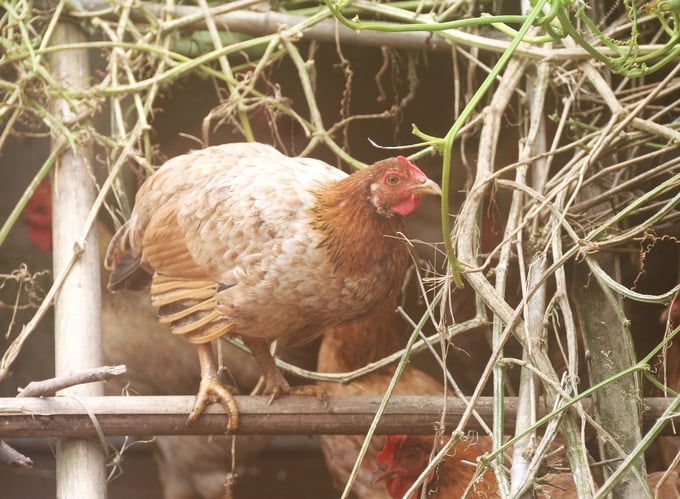
Thai Nguyen will not experience a shortage of livestock products at the end of the year. Photo: Pham Hieu.
“At the end of the year, the demand for food increases in both quantity and quality. Consumers will have strict requirements for food safety and hygiene. To meet such demands, Thai Nguyen is currently focusing on developing livestock farming in the direction of biosafety and organic farming. The province is forming over 20 closed chains from farming to slaughter, thereby improving the quality of livestock products supplied to the market,” said the leader of Thai Nguyen Sub-Department of Livestock Production, Animal Health and Fisheries.
Translated by Samuel Pham

(VAN) To address plastic pollution, closing the plastic recycling cycle will bring significant economic and environmental benefits.

(VAN) According to the Binh Thuan Department of Industry and Trade, in the first five months of 2025, Binh Thuan's dragon fruit export turnover increased by 20.65% compared to the same period last year.

(VAN) EU countries on Thursday gave final approval to new tariffs on fertilizer imports from Russia, a move aimed at cutting off revenue that could support Moscow’s war in Ukraine, despite concerns from European farmers.

(VAN) The working delegation from the Ministry of Agriculture and Environment conducted an important trip to the Netherlands to strengthen strategic partnerships and sustainable development in the agricultural sector.

(VAN) The letter ‘A Plea from the Ocean’ not only evokes emotion but also awakens the human conscience to the responsibility of protecting life on Earth.

(VAN) The Department of Agriculture in South Africa has announced the country’s first mass vaccination of poultry to prevent local birds from contracting avian influenza.

(VAN) Establishment of the Mekong Delta Regional Agricultural Linkage Center, aiming for a closed value chain, deep processing, trading platforms, and international market connectivity.